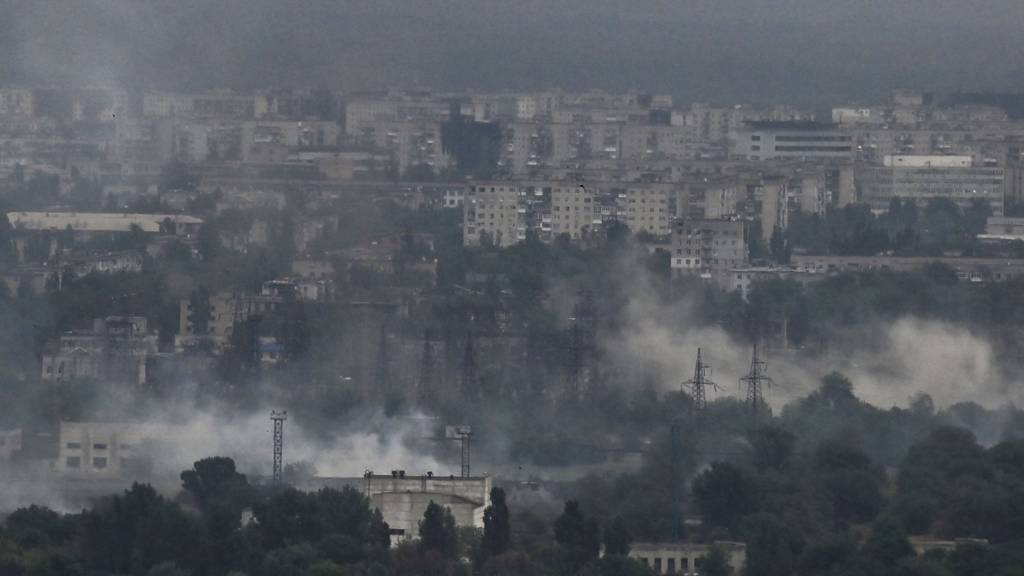
As it happened: Human cost of eastern city battle 'terrifying' - Zelensky
Updates from BBC correspondents: Joe Inwood and Nick Beake in Kyiv, Wyre Davies and Joel Gunter in Kharkiv, Orla Guerin in Donbas, and Steve Rosenberg in Moscow
Related Video and Audio
RTL
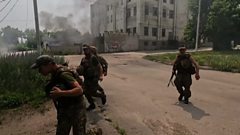
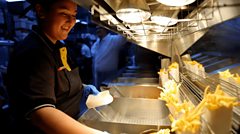
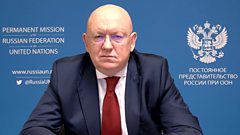
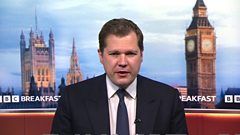
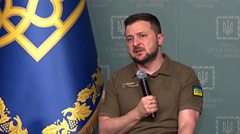
Live Reporting
Edited by Claire Heald
All times stated are UK
Get involved

Getty ImagesCopyright: Getty Images A resident walks between apartment blocks in Bakhmut, UkraineImage caption: A resident walks between apartment blocks in Bakhmut, Ukraine -
Battles for the city of Severodonetsk are still raging
-
All three bridges leading to the city have been destroyed, the regional governor says
-
Residents who remain in the city are surviving under extremely difficult conditions, he adds
-
Ukraine's President Volodymyr Zelensky says the battle for the city is "simply terrifying"
-
A military representative of the self-proclaimed Donetsk People's Republic said Ukrainian troops remaining in the city must "surrender or die"
-
UN human rights chief Michelle Bachelet warned the war risks plunging millions into poverty across the globe
-
Ukraine's grain harvest is likely to drop to about 48.5 million tonnes this year from 86 million tonnes last year, following Russia's invasion, a senior government official says
-
Up to 1,200 bodies, including some found in mass graves, have not yet been identified, the head of Ukraine's National Police said.

View more on instagramView more on instagram 
Getty ImagesCopyright: Getty Images Kremlin spokesman Dmitry PeskovImage caption: Kremlin spokesman Dmitry Peskov 
Dean Gatley/FacebookCopyright: Dean Gatley/Facebook 
TelegramCopyright: Telegram 
Getty ImagesCopyright: Getty Images Maksym Katerin stands in the yard of his damaged house today, after his mother and his step-father were killed in shellingImage caption: Maksym Katerin stands in the yard of his damaged house today, after his mother and his step-father were killed in shelling 
Getty ImagesCopyright: Getty Images A man tries to put out a fire with a bucket of water after a bombardment destroyed the home next door on FridayImage caption: A man tries to put out a fire with a bucket of water after a bombardment destroyed the home next door on Friday 
ReutersCopyright: Reuters A man and two boys cycle in an empty street in the city on Friday. In early June, an estimated 20,000 of the city's roughly 100,000 residents were thought to remain.Image caption: A man and two boys cycle in an empty street in the city on Friday. In early June, an estimated 20,000 of the city's roughly 100,000 residents were thought to remain. 
GettyCopyright: Getty Residents queue to receive bread given out by police officers in the city on Saturday.Image caption: Residents queue to receive bread given out by police officers in the city on Saturday. 
BBCCopyright: BBC Bodies of Bucha residents were found in makeshift graves by local police following the month-long occupationImage caption: Bodies of Bucha residents were found in makeshift graves by local police following the month-long occupation 
ReutersCopyright: Reuters Firefighters extinguish a fire at the central Maisky marketImage caption: Firefighters extinguish a fire at the central Maisky market 
ReutersCopyright: Reuters A soldier comforts a woman at the marketImage caption: A soldier comforts a woman at the market 
Getty ImagesCopyright: Getty Images This bridge, pictured in May, was the first of three linking Severodonetsk and Lysychansk to be destroyedImage caption: This bridge, pictured in May, was the first of three linking Severodonetsk and Lysychansk to be destroyed 
.Copyright: . 
.Copyright: . 

Getty ImagesCopyright: Getty Images Columns of smoke rise from Severodonetsk last weekImage caption: Columns of smoke rise from Severodonetsk last week 
Dean Gatley/FacebookCopyright: Dean Gatley/Facebook British soldier Jordan Gatley was killed while fighting Russian forces in SeverodonetskImage caption: British soldier Jordan Gatley was killed while fighting Russian forces in Severodonetsk 
Getty ImagesCopyright: Getty Images Battles are still raging in SeverodonetskImage caption: Battles are still raging in Severodonetsk -
Battles for the city of Severodonetsk are still raging
-
All three bridges leading to the city have been destroyed, the regional governor says
-
Residents who remain in the city are surviving under extremely difficult conditions, he adds, with the city under heavy fire
-
Ukraine's President Volodymyr Zelensky says Ukrainian troops are fighting for "literally every metre" of the city - which is still the focal point of the fighting in the eastern Donbas region
-
Ukrainian forces have been pushed out of the city centre because of Russia having a significant advantage in artillery, Ukraine's military says
-
Ukrainian troops remaining in the city must "surrender or die", a military representative of the self-proclaimed Donetsk People's Republic says
-
UN human rights chief Michelle Bachelet warns the war in Ukraine risks plunging millions into poverty across the globe
-
Ukraine's grain harvest is likely to drop to about 48.5 million tonnes this year from 86 million tonnes last year, following Russia's invasion, a senior government official says
-
A Russian blockade of Ukraine's Black Sea ports means efforts are being made to export by road, river and rail

.Copyright: . - How can Ukraine export its harvest to the world?

.Copyright: . 
Getty ImagesCopyright: Getty Images Anti-tank barriers sit among wheat fields in southern UkraineImage caption: Anti-tank barriers sit among wheat fields in southern Ukraine 
AFP via Getty ImagesCopyright: AFP via Getty Images A Ukrainian serviceman stands in a wheat field in the Donetsk region of UkraineImage caption: A Ukrainian serviceman stands in a wheat field in the Donetsk region of Ukraine 
AFPCopyright: AFP Russian journalist Marina Ovsyannikova was detained after she disrupted Russia's state TV news with an anti-war protest in MarchImage caption: Russian journalist Marina Ovsyannikova was detained after she disrupted Russia's state TV news with an anti-war protest in March 
BBCCopyright: BBC
Latest PostThe key developments today
We're pausing our live coverage shortly. Here's a look at the main developments in Ukraine today:
Updates were brought to you today by George Wright, Heather Sharp, James Harness, Alexandra Fouché, James Clarke, Victoria Lindrea, Nathan Williams, Jeremy Gahagan and Claire Heald.
Join us again tomorrow.
Here in Donbas, it looks like a losing battle
Orla Guerin
Reporting from Lysychansk
Ukraine’s president says Lysychansk is already dead, along with neighboring Severodonetsk - both ghost cities now.
Russia is not just destroying apartment buildings, flats and homes, it’s destroying history and the fabric of cities. This is a deliberate tactic - bomb, shell, burn, and leave nothing but scorched earth.
Those who remain make brief escapes from their basements to cook outdoors. The city has no power or running water.
The city is running out of time. This is now an artillery war and Ukraine doesn’t have enough big guns or ammunition.
Just a short distance away, neighbouring Severodonetsk is burning and may soon fall.
Ukrainian troops there are fighting building to building, street to street but all bridges to the city have now been destroyed.
Ukraine is facing an enemy that has learned lessons and is imposing crushing losses in battle. Troops fight on but the handful of advanced weapon systems promised by Britain and the United States may be too little, too late.
Here in the Donbas region right now, it looks like a losing battle.
Read Orla's report in full: Russia erasing history in Ukraine's 'dead city'.
'Even on crutches... - forward to victory'
Some lighter news from Ukraine now - Foreign Minister Dmytro Kuleba has injured his leg while playing sport.
"There could be a story about an enemy sabotage and reconnaissance group. But in reality, I just injured my leg trying to resume sports for the first time since the beginning of the war," Kuleba wrote on Instagram, posting a photo of himself with a bandaged leg.
He didn't disclose what sport he was playing.
"Trouble happens, but it doesn't get me off my feet. There is no time to leave the ranks now," he wrote.
He said that he will continue to work on the issues of heavy weapons, Russian sanctions and EU candidate status for Ukraine.
"Even on crutches and one leg - forward to victory," Kuleba added.
We are protecting people's republics - Kremlin
Turning now to Russia and it says the main goal of its military operation in Ukraine is to protect what it calls the Donetsk and Luhansk people's republics, a spokesman for the Kremlin says.
"In general, the protection of the republics is the main goal of the special military operation," Dmitry Peskov says, according to Russia's RIA state news agency.
Russian officials only refer to the invasion as a "special military operation" aiming to "demilitarise" or "de-Nazify" Ukraine, referencing a baseless claim about Nazis in the Ukrainian government, which Moscow uses to justify the invasion.
Donetsk and Luhansk are two breakaway Russian-backed entities in the Donbas region of eastern Ukraine. Russia is currently focusing its war effort on Donbas after its forces were forced to retreat from other parts of the country.
Ukrainian international legion says killed UK soldier one of 'ours'
More now on a former British soldier who was killed while fighting in Ukraine.
The International Legion for the Defence of Ukraine says he was one of its members.
Jordan Gatley left the British army in March and travelled to Ukraine, where he died in the battle for control of Severodonetsk.
“We can confirm that Jordan Gatley was a legionnaire and he was in the International Legion for the Defence of Ukraine," the Ukrainian legion said in a statement.
"Jordan made the ultimate sacrifice defending Ukraine, her sovereignty and freedom," it said.
"Jordan will forever be a hero of Ukraine and the legion. We thank Jordan for his service and selfless sacrifice.”
'We are dealing with absolute evil'
More now from President Zelensky's nightly address to the Ukrainian people.
He says he thinks the human cost of the battle for the eastern Donbas region "will without doubt be remembered in military history as one of the most violent battles in Europe".
Earlier this month, Zelensky said his army was losing "between 60 and 100 soldiers" a day in the battle for Donbas.
"We are dealing with absolute evil. And we have no choice but to move forward and free our territory," he adds.
Read more: Why is Russia trying to capture Donbas?
Battle for Severodonetsk is terrifying - Zelensky
Ukrainian President Volodymyr Zelensky has been speaking about Severodonetsk, the strategically important city in the east that Russian forces are close to fully occupying.
"The human cost of this battle is very high for us. It is simply terrifying," Zelensky says on Telegram in his daily address to the Ukrainian people.
All three bridges leading to the city have been destroyed, the regional governor reported earlier this evening.
Ukrainian troops remaining in the city must "surrender or die", a military representative of the self-proclaimed Donetsk People's Republic has said.
In pictures: Lysychansk under fire
We've been following the battle in the eastern city of Severodonetsk, which appears to be falling increasingly under Russian control amid intense street battles.
Across the river lies its twin city, Lysychansk. It's still in Ukrainian hands, but the regional governor says it's under heavy Russian fire. Assuming Russia is aiming to control all of Luhansk, it will be the next target after Severodonetsk.
Photographs from the past few days give a sense of life for those remaining in Lysychansk.
Another mass grave found in Bucha - regional police
Regional police claim seven bodies, several with their hands and legs tied, have been found in a grave near the town of Bucha, on the outskirts of Kyiv, reports AFP.
"Seven civilians were tortured by the Russians then executed in a cowardly manner with a bullet to the head," Kyiv regional police chief Andriy Nebytov has written on Facebook.
"This grave was discovered today in an area where Russian troops were stationed near the village of Myrotske", he writes, adding police are "working to identify the deceased".
The town of Bucha was occupied by Russian troops during the initial weeks of the invasion. After the town was liberated in early April, at least 500 dead bodies were found, many in makeshift and mass graves.
Russia, which withdrew from the town on 30 March, has repeatedly rejected allegations of war crimes in Bucha - insisting they are "falsifications" by Ukraine, backed by its allies in the West.
Read more about the bodies found in Bucha.
At least three killed in Ukrainian attack on Donetsk, separatists say
Away from the fighting in Severodonetsk, at least three people, including a child, have been killed and 18 injured, in a Ukrainian artillery attack at a market in the Russian-backed separatist Ukrainian region of Donetsk, officials there said.
The Donetsk News Agency has shown pictures of parts of central Maisky market in flames and bodies on the ground.
"We had a hit to the market - there were many people here," Yan Gagin, an adviser to the separatists' self-styled government, tells the Russian RIA news agency.
He says a woman and child were among the dead.
Local health officials report 18 people have been injured, including two children.
The BBC has been unable to verify these reports.
Why is the battle for Severodonetsk important?
For weeks now, Severodonetsk has been the focus of Russian military bombardment in Ukraine.
Reports suggest about 70% of the city is currently under Russian control.
Severodonetsk, and its twin city, Lysychansk, form an important regional and industrial focal point in the Luhansk region of eastern Ukraine.
Capturing the two cities would give Russia control of the entire Luhansk region - parts of which are already controlled by Russian-backed separatists.
The twin cities sit astride the strategic Siversky Donets river, while the key, 90km-long (56 miles) central sector of Russia’s front line lies to the west of the river.
The regional governor says the third of three bridges into the city has been destroyed today, a day after the second. With Russian-controlled areas to the north, east and south of Severodonetsk, this greatly reduced access to and from Ukrainian-held areas.
Regional governor Serhiy Haidai has said he believes Lysychansk, which is on higher ground, is of more strategic importance, and that the Russians have also been targeting the road from Bakhmut towards the two cities.
Only around 15,000 people, from a pre-war population of 100,000, are still believed to be in the city. With heavy shelling and intense street fighting ongoing, evacuation is impossible at present, with the situation described as "extremely difficult".
Luhansk and the neighbouring region of Donetsk - which run from Mariupol in the south all the way to the northern border with Russia - make up the Donbas, whose so-called "liberation" is currently Russian President Putin's top priority.
Russian military success in the Donbas could lead to annexation by Moscow of the entire region, US officials believe.
Russia appears on cusp of taking Severodonetsk
Nick Beake
Reporting from Kyiv
The battle for Severodonetsk has been as intense as any fight in the Donbas region, but it seems Russia is now on the cusp of taking the city.
The regional Ukrainian governor, Serhiy Haidai, warned of an imminent symbolic and strategic loss, saying Severodonetsk will soon be cut off from the rest of the country if the Russians destroy its last remaining bridge.
It was in this fierce frontline fight that British ex-soldier Jordan Gatley was shot dead, his family revealed at the weekend.
Yuriy Sak, an adviser to Ukraine's defence minister, said his country was deeply grateful for ongoing foreign support, but that weapons from the West were not arriving as quickly as they should. He said every Ukrainian city remained at risk of Russian attack, not just those in the east of the country.
President Zelensky has called for upgraded aerial defence systems, revealing that more than 2,600 cruise missiles have landed in Ukraine since the start of the war.
No idea how many Britons fighting in war - defence secretary
Returning now to news in the last few days that a former UK soldier has been killed in Severodonetsk, the UK's Defence Secretary Ben Wallace says he doesn't know how many veterans are fighting in Ukraine.
"The simple reality is we don't know," he told MPs, when quizzed by shadow defence secretary John Healey.
Wallace said, at the outbreak of the conflict in February, politicians had "publicly made statements to try and deter" UK citizens from joining the fight in Ukraine.
It follows Friday's news of the death of Jordan Gatley, shot dead in Severodonetsk.
"Obviously I, like others, am saddened by the loss of the other former veteran who was reported killed recently," said the defence secretary.
Two Britons captured and condemned to death for fighting Russian forces "were themselves living in Ukraine or half Ukrainian", he added.
"But as far as individuals who decided of their own volition to go and fight, separate from the United Kingdom, or indeed separate of any of the United Kingdom's serving personnel, we are unaware of the total number."
He said the question had been raised with his Ukrainian counterpart "on a number of occasions".
"It is, of course, for the Ukrainians to answer and find those details, but I do have some sympathy with the Ukrainians - they are fighting a war, and not one or two or three of their citizens are on that front, tens of thousands of those citizens."
What's the latest?
Just joining us or need a recap? Here are the latest developments from Ukraine:
Severodonetsk
Grain
All bridges to Severodonetsk destroyed - regional governor
All three bridges to the embattled city of Severodonetsk have been destroyed, says regional governor Serhiy Haidai.
In an update, he says although Russian troops have not completely captured the city - which is at the centre of the fighting between Russian and Ukrainian troops - all bridges leading to the regional centre have now been destroyed, making the evacuation of residents and the transportation of goods impossible.
Residents who remain in the city are surviving under extremely difficult conditions, he adds, with the city under heavy fire.
Set up humanitarian zone to enable grain exports, UK MP urges
A UN-approved humanitarian zone should be set up around the port of Odesa, a British MP says, to ensure exports of grain can get out of Ukraine, which is one of the world's main food producers.
Tobias Ellwood, who chairs the Commons Defence Committee, says with Russia consolidating in the Donbas, "there's every chance they may be turning their sights to Odesa".
"If this port falls, Ukraine will be landlocked, further impacting on the cost-of-living crisis across Europe, including here, because critical grain exports can't get out," he says.
He suggests to Defence Secretary Ben Wallace the UK could "lead a coalition of willing Nato allies to secure a UN General Assembly-approved humanitarian zone around the port and territorial waters, with neighbouring international waters policed by an international maritime force".
"This would ensure the breadbasket of Europe and beyond is able to function and remain part of Ukraine," Ellwood says.
Wallace says Ellwood makes a "very valid" suggestion about the importance of getting the grain out of Ukraine, but adds: "I'm afraid it is definitely easier said than done when it comes to securing that Black Sea and a UN mandate to do that."
Millions 'could be plunged into food insecurity by war'
UN human rights chief Michelle Bachelet has spoken to the UN’s human rights council in Geneva about the "havoc and destruction" caused by Russia's invasion of Ukraine - and the consequential risks of plunging millions into poverty across the globe.
"Since we last gathered the war in Ukraine continues to destroy the lives of many.... the horrors inflicted on the civilian population will leave their indelible mark, including on generations to come," she said, at the gathering on Monday.
"Its social, economic and political ramifications ripple across the region and globally - with no end in sight," she continued, adding that the "global food, fuel and finance crisis now risks plunging millions into food insecurity and poverty".
According to the World Food Programme, the number of people living with severe food insecurity is expected to grow "from 276 million at the start of 2022, to 323 million in the course of the year" - with the poorest in society likely to suffer the most, Ms Bachelet concluded.
Ukraine grain harvest likely to drop by almost half - official
Ukraine's grain harvest is likely to drop to around 48.5 million tonnes this year from 86 million tonnes last year following Russia's invasion, a senior government official said.
First Deputy Agriculture Minister Taras Vysotskyi told Reuters that the total area sown had fallen by 25% and the exportable surplus could be 30 million tonnes, meaning a huge loss of revenue.
Ukraine is a major global grain and oil seed grower, but its exports have been severely hit since Russia's invasion.
A Russian blockade of Ukraine's Black Sea ports means efforts are being made to export by road, river and rail.
UN chief 'worried' by Russian crackdown on free speech
UN Human Rights chief Michelle Bachelet has used her speech to the UN’s human rights council in Geneva, to express her concerns around Russia's censorship of free speech and the media.
She highlighted new criminal laws which had been introduced effectively banning "the dissemination of information - based on vague and ambiguous notions including false news".
Bachelet said she regretted "the increasing censorship and restrictions on independent media” - and described "the arbitrary arrest of a large number of anti-war protesters" in Russia as "worrying".
Western weaponry 'not arriving quickly enough'
An adviser to Ukraine's defence minister says more weapons are needed urgently from the West.
Speaking on BBC World Service's Newshour, Yuriy Sak says that though Ukraine is grateful for the weapons it has received so far from Western countries, further supplies are not arriving as quickly as they should.
"We are a little concerned, there is not sufficient understanding of the level of the threat we are facing and Europe is facing," he says.
In Severodonetsk in the eastern Donbas region - where fighting is at its fiercest - he says the Ukrainian army continues to protect the city "with what we can," but that it would have been "much more efficient at repelling the enemy and liberating Ukrainian land had we received more heavy weaponry by now."
Russia's advantage is overwhelming, he adds.
"On average, they shoot about 50,000 rounds a day, now this is literally a barrage of mortar shells, air bombardment, missiles strikes.
"There is not even one Ukrainian city at the moment which is not in the risk zone. Just today we have a missile strike in one of the cities in the Chernihiv region, which is not in the east of Ukraine. But nevertheless it was hit."